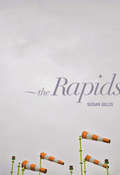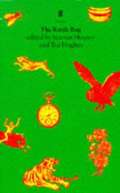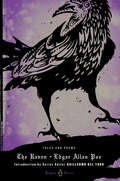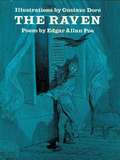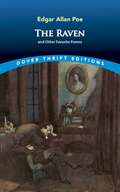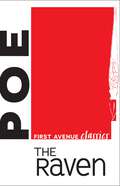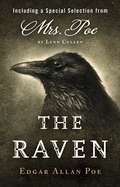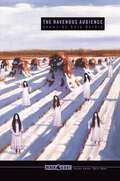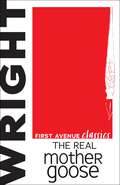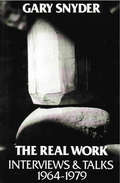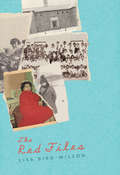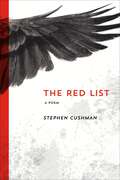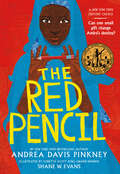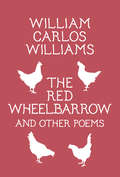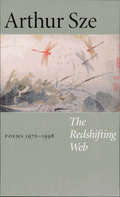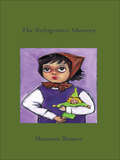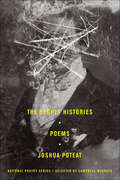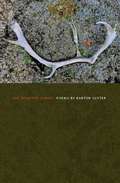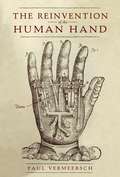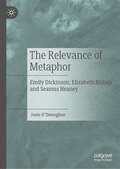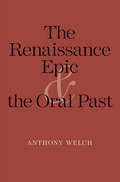- Table View
- List View
The Rapids
by Susan GillisUrgent and precarious, the poems in The Rapids, Susan Gillis’ third collection, take us to places lost and reclaimed: a balcony high over the St. Lawrence River in downtown Montreal, upstream to the Lachine Rapids, and beyond, to landscapes as far apart as Greece and the B.C. coast.
The Rattle Bag
by Seamus Heaney Ted HughesThe Rattle Bagis an anthology of poetry (mostly in English but occasionally in translation) for general readers and students of all ages and backgrounds. These poems have been selected by the simple yet telling criteria that they are the personal favorites of the editors, themselves two of contemporary literature's leading poets. Moreover, Heaney and Hughes have elected to list their favorites not by theme or by author but simply by title (or by first line, when no title is given). As they explain in their Introduction: "We hope that our decision to impose an arbitrary alphabetical order allows the contents [of this book] to discover themselves as we ourselves gradually discovered them--each poem full of its singular appeal, transmitting its own signals, taking its chances in a big, voluble world. " With undisputed masterpieces and rare discoveries, with both classics and surprises galore,The Rattle Bagincludes the work of such key poets as William Shakespeare, Walt Whitman, Emily Dickinson, Lewis Carroll, Dylan Thomas, Wallace Stevens, Elizabeth Bishop, and Sylvia Plath among its hundreds of poems. A helpful Glossary as well as an Index of Poets and Works are offered at the conclusion of this hefty, unorthodox, diverse, inspired, and inspiring collection of poetry.
The Raven
by Edgar Allan Poe Guillermo Del ToroA new six-volume series of the best in classic horror, selected by award-winning director Guillermo del Toro Filmmaker and longtime horror literature fan Guillermo del Toro serves as the curator for the Penguin Horror series, a new collection of classic tales and poems by masters of the genre. Included here are some of del Toro's favorites, from Mary Shelley's Frankenstein and Ray Russell's short story "Sardonicus," considered by Stephen King to be "perhaps the finest example of the modern Gothic ever written," to Shirley Jackson's The Haunting of Hill House and stories by Ray Bradbury, Joyce Carol Oates, Ted Klein, and Robert E. Howard. Featuring original cover art by Penguin Art Director Paul Buckley, these stunningly creepy deluxe hardcovers will be perfect additions to the shelves of horror, sci-fi, fantasy, and paranormal aficionados everywhere. The Raven The Raven: Tales and Poems is a landmark new anthology of Poe's work, which defied convention, shocked readers, and confounded critics. This selection of Poe's writings demonstrates the astonishing power and imagination with which he probed the darkest corners of the human mind. "The Fall of the House of Usher" describes the final hours of a family tormented by tragedy and the legacy of the past. In "The Tell Tale Heart," a murderer's insane delusions threaten to betray him, while stories such as "The Pit and the Pendulum" and "The Cask of Amontillado" explore extreme states of decadence, fear and hate. The title narrative poem, maybe Poe's most famous work, follows a man's terrifying descent into madness after the loss of a lover.
The Raven
by Edgar Allan Poe Gustave DoréIn Gustave Doré, one of the most prolific and successful book illustrators of the late 19h century, Edgar Allan Poe's renowned poem The Raven found perhaps its most perfect artistic interpreter. Doré's dreamlike, otherworldly style, tinged with melancholy, seems ideally matched to the bleak despair of Poe's celebrated work, among the most popular American poems ever written.This volume reprints all 26 of Doré's detailed, masterly engravings from a rare 19th-century edition of the poem. Relevant lines from the poem are printed on facing pages and the complete text is also included. Admirers of Doré will find ample evidence here of his characteristic ability to capture the mood and meaning of a work of literature in striking imagery; lovers of The Raven will delight in seeing its mournful musing on love and loss given dramatic pictorial form.A selection of the Common Core State Standards Initiative.
The Raven and Other Favorite Poems (Dover Thrift Editions: Poetry Ser.)
by Edgar Allan PoeOne of the most famous poems in the English language, "The Raven" first appeared in the January 29, 1845, edition of the New York Evening Mirror. It brought Edgar Allan Poe, then in his mid-30s and a well-known poet, critic, and short story writer, his first taste of celebrity on a grand scale. "The Raven" remains Poe's best-known work, yet it is only one of a dazzling series of poems and stories that won him an enduring place in world literature.This volume contains "The Raven" and 40 others of Edgar Allan Poe's most memorable poems, among them "The Bells," "Ulalume," "Israfel," "To Helen," "The Conqueror Worm," "Eldorado," and "Annabel Lee." Together they reveal the extraordinary spectrum of Poe's personality -- his idealism; his visionary qualities; his responsiveness to beauty, to love, and to women; and his susceptibility to the eerie and the morbid. They reveal, too, his virtuoso command of poetic language, rhythms, and figures of speech -- command that would make his one of the most distinctive voices in all of poetry.A selection of the Common Core State Standards Initiative.
The Raven: A Melodrama (classic Reprint) (First Avenue Classics ™)
by Edgar Allan PoeDuring a dark night in December, a man sits in his room sadly thinking about his lost love, Lenore. Suddenly, he hears a tapping on the door, but no one is there. The noise moves to the window and the man opens it, only to see an ominous raven. The raven only has one thing to say and, as the night goes on, his haunting call of "Nevermore" begins to make the man more and more paranoid. This unabridged version of Edgar Allan Poe's eerie poem, first published in 1884, is accompanied by Gustave Doré's stunning woodcut illustrations.
The Raven: With The Philosophy Of Composition (Lezama Ser.)
by Edgar Allan PoeVisions in Poetry is an exciting and unique series of classic poems illustrated by outstanding contemporary artists in stunning hardcover editions. The fifth book in the series, Edgar Allan Poe's "The Raven," delves into the hidden horrors of the human psyche. Originally published in 1845, the poem is narrated by a melancholy scholar brooding over Lenore, a woman he loved who is now lost to him. One bleak December at midnight, a raven with fiery eyes visits the scholar and perches above his chamber door. Struggling to understand the meaning of the word his winged visitant repeats - "Nevermore!" - the narrator descends by stages into madness. Illustrator Ryan Price's exquisitely grim illustrations suggest a background story shaped by the narrator's guilt, embodied in the terrifying figure of the raven. Price's drypoint technique, with its rich blacks and feathery lines, perfectly captures the nightmarish atmosphere of this unforgettable poem.
The Ravenous Audience (Black Goat #0)
by Kate DurbinA startling debut volume, the latest in Chris Abani's Black Goat Poetry Series. "Christianity or cuisine, cinema or sex manuals, Eros or Thanatos, Artaud or Marilyn Monroe? Marry or suture or eat all of them and you are close to Ravenous. A brutal tour de force." --Juan Felipe Herrera, author of Half of the World in Light "Durbin's debut volume sizzles...Throughout this deeply feminist, groundbreaking collection, she employs both the elemental forces of her intellect and a vigorous intensity of startling imagery to implode or explode conventional notions of sexuality and womanhood." --Maurya Simon, author of Cartographies "Durbin writes first-rate traditional lyric poems, while at other times she writes poems that push the limits of the avant-garde and, most amazingly, at other times, she makes a loving marriage of the two! This is an exceptional debut by a young poet burning with talent." --Thomas Lux, author of God Particles Black Goat is an independent poetry imprint of Akashic Books created and curated by award-winning Nigerian author Chris Abani (author of Becoming Abigail and Song for Night). Black Goat is committed to publishing well-crafted poetry with a focus on experimental or thematically challenging work. The series aims to create a proportional representation of female poets and non-American poets, particularly poets from Africa. Little Red Riding Hood, Jezebel, Catherine Breillat's Fat Girl, Marilyn Monroe, Amelia Earhart, Pier Paolo Pasolini's Christ--these are only a few of the archetypal and pop cultural characters that populate Kate Durbin's strange and mesmerizing coming-of-age poetry collection, The Ravenous Audience.
The Reader's Anthology
by Robert PotterClassic and contemporary works by authors such as Maya Angelou, Laura Ingalls Wilder, Langston Hughes, and Robert Frost help students comprehend and enjoy fiction, nonfiction, poetry, and drama. In addition, each book has a controlled reading level and a strong vocabulary strand. Reading Level: 5-9 Interest Level: 6-12
The Real Mother Goose (First Avenue Classics ™)
by Blanche Fisher WrightThe identity of Mother Goose may remain a mystery, but the timeless appeal of the fairy tales and nursery rhymes associated with this cherished imaginary author has lasted for generations of young readers. This collection includes more than three hundred of Mother Goose's best-known and best-loved nursery rhymes for children. Here, Humpty Dumpty has a great fall, Jack and Jill go up the hill, and the dish runs away with the spoon. Peter Piper picks a peck of pickled peppers, little Miss Muffet sits on a tuffet, and Mother Goose herself rides through the air on a very fine gander. Also included are favorites such as "Three Blind Mice," "Little Bo-Peep," "Hot Cross-Buns," and "Mary, Mary, Quite Contrary." This collection, taken from the 1916 copyright edition, features charming full-color illustrations by Blanche Fisher Wright.
The Real Work: Interviews and Talks, 1964-79
by Gary Snyder William Scott McleanAmerican poet Gary Snyder on poetics, tribalism, ecology, Zen Buddhism, meditation, the writing process, and more. The Real Work is the second volume of Gary Snyder’s prose to be published by New Directions. Where his earlier Earth House Hold(1969) heralded the tribalism of the "coming revolution," the interviews in The Real Work focus on the living out of that process in a particular place and time––the Sierra Nevada foothills of Northern California in the 1970s. The talks and interviews collected here range over fifteen years (1964-79) and encompass styles as different as those of the Berkeley Barb and The New York Quarterly. A "poetics of process" characterizes these exchanges, but in the words of editor Mclean, their chief attraction is "good, plain talk with a man who has a lively and very subtle mind and a wide range of experience and knowledge."
The Red Files
by Lisa Bird-WilsonThis debut poetry collection from Lisa Bird-Wilson reflects on the legacy of the residential school system: the fragmentation of families and histories, with blows that resonate through the generations.Inspired by family and archival sources, Bird-Wilson assembles scraps of a history torn apart by colonial violence. The collection takes its name from the federal government's complex organizational structure of residential schools archives, which are divided into "black files" and "red files." In vignettes as clear as glass beads, her poems offer affection to generations of children whose presence within the historic record is ghostlike, anonymous and ephemeral.The collection also explores the larger political context driving the mechanisms that tore apart families and cultures, including the Sixties Scoop. It depicts moments of resistance, both personal and political, as well as official attempts at reconciliation: "I can hold in the palm of my right hand / all that I have left: one story-gift from an uncle, / a father's surname, treaty card, Cree accent echo, metal bits, grit- / and I will still have room to cock a fist."The Red Files concludes with a fierce hopefulness, embracing the various types of love that can begin to heal the traumas inflicted by a legacy of violence.
The Red List: A Poem
by Stephen CushmanThe "red list" of Stephen Cushman's new volume of poetry is the endangered species register, and the book begins and ends with the bald eagle, a bird that bounded back from the verge of extinction. The volume marks the inevitability of such changes, from danger to safety, from certainty to uncertainty, from joy to sadness and back again. In a single poem that advances through wordplay and association, Cushman meditates on subjects as vast as the earth's fragile ecosystem and as small as the poet's own deflated fantasy of self-importance: "There aren't any jobs for more Jeremiahs."Simultaneously teasing the present and eulogizing what has been lost, Cushman speaks like a Shakespearean jester, freely and foolishly, but with penetrating insight.
The Red Pencil
by Andrea Davis Pinkney Shane W. Evans"Amira, look at me," Muma insists. She collects both my hands in hers. "The Janjaweed attack without warning. If ever they come-- run." <p><p>Finally, Amira is twelve. Old enough to wear a toob, old enough for new responsibilities. And maybe old enough to go to school in Nyala-- Amira's one true dream.<p>But life in her peaceful Sudanese village is shattered when the Janjaweed arrive. The terrifying attackers ravage the town and unleash unspeakable horrors. After she loses nearly everything, Amira needs to dig deep within herself to find the strength to make the long journey-- on foot-- to safety at a refugee camp. Her days are tough at the camp, until the gift of a simple red pencil opens her mind-- and all kinds of possibilities.<p>New York Times bestselling and Coretta Scott King Award-winning author Andrea Davis Pinkney's powerful verse and Coretta Scott King Award-winning artist Shane W. Evans's breathtaking illustrations combine to tell an inspiring tale of one girl's triumph against all odds.
The Red Wheelbarrow & Other Poems
by William Carlos WilliamsHere is a perfect little gift: the most beloved poems by the most essential American poet of the last century Gathered here are the gems of William Carlos Williams’s astonishing achievements in poetry. Dramatic, energetic, beautiful, and true, this slim selection will delight any reader—The Red Wheelbarrow & Other Poems is a book to be treasured.
The Redshifting Web
by Arthur SzeThis collection spans more than a quarter century of published work, including selections from five previous award-winning books, and makes available for the first time the full range of Sze's remarkable poetry. Through the startling juxtaposition of images, Sze reveals the interconnectedness, the interdependency of things and ideas, always with an ear attuned to pitch and cadence.
The Refrigerator Memory
by Shannon BramerThe Refrigerator Memory is an exuberant, strangely funny celebration of sadness.With fable-like miniature stories and short lyric poems, Shannon Bramer creates a world littered with stolen pears and prosthetic arms and inhabited by Kindness scientists and hot-air-balloon operators. The poems invoke a world of childhood delights and demons in the context of grown-up fears and appetites: heartbreak, loss, jealousy and old-fashioned sibling rivalry. You'll find the hopelessly misunderstood Love the Clown (never goes out without his red wig) and Noni, a forlorn young man who can't stop crying.But while sadness plays a starring role, the true hero of the collection is the imagination; its transformative powers warm widows and drunken gods and designated mourners. You won't forget The Refrigerator Memory: the icebox cometh to warm your heart.
The Regret Histories: Poems
by Joshua PoteatThis powerful and provocative new installment of poetry is a recipient of the 2014 National Poetry Series Prize, as chosen by Campbell McGrath.The National Poetry Series’s long tradition of promoting exceptional poetry from lesser-known poets delivers another outstanding collection of poetry by Joshua Poteat.Through an investigation of the haunted spaces where history collides with the modern southern American landscape, The Regret Histories explores themes of ruin and nostalgia, our relationship to a collective past, and the extraordinary indifference of time to memory.For thirty years, the National Poetry Series has discovered many new and emerging voices and has been instrumental in launching the careers of poets and writers such as Billy Collins, Mark Doty, Denis Johnson, Marie Howe, and Sherod Santos.
The Reindeer Camps
by Barton SutterA winner of the Minnesota Book Award in fiction, poetry, and non-fiction, Barton Sutter's latest collection details life on the Canadian border, presents portraits of northern plants and animals, rejoices in marriage, and traces the ancient ways of Siberian reindeer herders. The late Bill Holm called it "unlike anything Sutter (or anyone else) has done before." Sutter's poetry reminds us that other cultures have survived for millennia by living closer to the ground.Born in 1949, Barton Sutter was raised in Minnesota and Iowa. He retired from the University of Wisconsin-Superior in 2011 and now lives in Duluth, Minnesota.
The Reindeer Camps (American Poets Continuum)
by Barton SutterA winner of the Minnesota Book Award in fiction, poetry, and non-fiction, Barton Sutter's latest collection details life on the Canadian border, presents portraits of northern plants and animals, rejoices in marriage, and traces the ancient ways of Siberian reindeer herders. The late Bill Holm called it "unlike anything Sutter (or anyone else) has done before." Sutter's poetry reminds us that other cultures have survived for millennia by living closer to the ground.Born in 1949, Barton Sutter was raised in Minnesota and Iowa. He retired from the University of Wisconsin-Superior in 2011 and now lives in Duluth, Minnesota.
The Reinvention of the Human Hand
by Paul VermeerschPaul Vermeersch's new poems give a present-day voice to primitive song, and restore to us a dawn-time severity that cuts through modern evasions. They go beyond sophistication to reveal the passionate and suffering animal within. The Reinvention of the Human Hand is a poetry of the human body's experience, of a primal being that struggles to assert itself, or perhaps just survive, in a world of metals, plastics, electronics. Here is the most far-reaching work yet by the acclaimed author of Burn, The Fat Kid, and Between the Walls. Vermeersch has always gone in search of understanding. Now his discoveries speak of a human world exhausted by its divorce from an animal past, terrified of retreating into early places it never truly left, astonished by the forgotten possibilities disclosed there.From the Trade Paperback edition.
The Relevance of Metaphor: Emily Dickinson, Elizabeth Bishop and Seamus Heaney
by Josie O'DonoghueThis book considers metaphor as a communicative phenomenon in the poetry of Emily Dickinson, Elizabeth Bishop and Seamus Heaney, in light of the relevance theory account of communication first developed by Dan Sperber and Deirdre Wilson in the 1980s. The first half of the book introduces relevance theory, situating it in relation to literary criticism, and then surveys the history of metaphor in literary studies and assesses relevance theory’s account of metaphor, including recent developments within the theory such as Robyn Carston’s notion of ‘the lingering of the literal’. The second half of the book considers the role of metaphor in the work of three nineteenth- and twentieth-century poets through the lens of three terms central to relevance theory: inference, implicature and mutual manifestness. The volume will be of interest to students and scholars working in literary studies, pragmatics and stylistics, as well as to relevance theorists.
The Renaissance Epic and the Oral Past
by Anthony WelchThis book offers a close survey of the changing audiences, modes of reading, and cultural expectations that shaped epic writing in the sixteenth and seventeenth centuries.According to Anthony Welch, the theory and practice of epic poetry in this period--including little-known attempts by many epic poets to have their work orally recited or set to music--must be understood in the context of Renaissance musical humanism. Welch's approach leads to a fresh perspective on a literary culture that stood on the brink of a new relationship with antiquity and on the history of music in the early modern era.
The Renaissance: Studies in Art and Poetry
by Walter Horatio PaterA discussion of Renaissance art and poetry from a 19th-century author with scholarly annotations.
